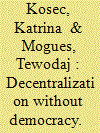|
|
|
Sort Order |
|
|
|
Items / Page
|
|
|
|
|
|
|
| Srl | Item |
| 1 |
ID:
190469


|
|
|
|
|
| Summary/Abstract |
The essay describes the adoption of an active ageing policy framework in Russia. Based on semi-structured interviews with elderly Russians, the essay provides evidence of confusion and uncertainty on how to perceive one's own ageing. Research participants understood that the ‘paternalistic’ view of old age as a time of troubles was now largely viewed as obsolete, yet the new ‘optimistic’ view of old age as a time of freedom and opportunities often did not reflect their experiences. This mismatch in discourses and practices reflects how participatory empowerment rhetoric, which promotes active ageing, is becoming a justification for more modest state social service provision.
|
|
|
|
|
|
|
|
|
|
|
|
|
|
|
|
| 2 |
ID:
187986


|
|
|
|
|
| Summary/Abstract |
This study analysed the short- and long-term impacts of fiscal consolidation on social sector spending in Indian economy and thereby on human capital. Using autoregressive distributed lag framework, the study found that fiscal adjustments have significant potential to undermine the short- and long-run spending in human capital. A fiscal adjustment aimed at strengthening fiscal position of the Indian economy can have adverse impacts on the growth rate of income. Lower-income growth will imply increased constraint on part of the government to spend in public utilities like education and health. Similarly, a fiscal adjustment based on slashing government spending can adversely impact both short- and long-term welfare spending as these spendings are mainly financed by deficits. The policymakers while framing the design of a consolidation programme need to take extra precaution as far as the composition of these adjustments are concerned. Moreover, there is need of legislate aimed at changing the nature of welfare spending from discretionary to compulsory.
|
|
|
|
|
|
|
|
|
|
|
|
|
|
|
|
| 3 |
ID:
185756


|
|
|
|
|
| Summary/Abstract |
The COVID-19 pandemic has shaken the global economy and the livelihoods of disadvantaged populations. Bangladesh, like other developing countries, has been hit hard, and marginalized groups have suffered the most. Before the pandemic, Bangladesh’s economy was growing rapidly, and the country was known for its steady improvement in health and education development indicators. Yet in its pandemic response, the government has been unable to provide adequate aid and health facilities for the large population living in poverty. The response has been hampered by lack of resources, corruption in the delivery of economic support, and existing health inequalities.
|
|
|
|
|
|
|
|
|
|
|
|
|
|
|
|
| 4 |
ID:
173005


|
|
|
|
|
| Summary/Abstract |
Increasingly, decentralization is being adopted by countries in which assumptions made by formal models of decentralization, such as electoral accountability and population mobility, fail to hold. How does decentralization affect public service delivery in such contexts? The authors exploit the partial rollout of decentralization in the autocratic context of Ethiopia and use a spatial regression discontinuity design to identify its effects. Decentralization improves delivery of productive services, specifically, agricultural services, but has no effect on social services, specifically, drinking water services. This finding is consistent with a model in which local leaders have superior information about the public investments that will deliver the greatest returns and they are incentivized by decentralization to maximize citizens’ production—on which rents depend—rather than citizens’ utility. These findings shed light on nonelectoral mechanisms through which decentralization affects public goods provision and help to explain decentralization’s mixed effects in many nondemocratic settings.
|
|
|
|
|
|
|
|
|
|
|
|
|
|
|
|
| 5 |
ID:
137794


|
|
|
|
|
| Summary/Abstract |
Like many nonstate military actors, Hamas has long provided social services to its constituents, but the mechanism by which charity leads to increased public support is poorly understood. This article argues that providing charity benefits nonstate actors not because it isolates recipients or acts as a bribe but because it allows organizations like Hamas to overcome the legacies of their own military activities and extremist ideologies. Service provision allows them to demonstrate that they are not merely soldiers or ideologues, but capable bureaucrats and managers as well.
|
|
|
|
|
|
|
|
|
|
|
|
|
|
|
|
| 6 |
ID:
114160


|
|
|
|
|
| Publication |
2012.
|
| Summary/Abstract |
This article explains the employment practices at Turkish state factories during the 1930s and 1940s when the state expanded industrial activity. Complaints about the availability of industrial workers had been commonplace since the population exchange, but emerged as a key constraint on industrial activity in the 1930s and 1940s, as industrial production expanded considerably. The article argues that the Turkish state introduced social services in Turkish state factories in response to workers' resistance to the low wages and long hours of work. Rather than a deliberate attempt at populism or building political support, the expansion of social amenities through state economic enterprises reflected the weakness of the state in enforcing industrial discipline and the limitations of creating industrial labour forces through compulsion.
|
|
|
|
|
|
|
|
|
|
|
|
|
|
|
|
| 7 |
ID:
082923


|
|
|
|
|
| Publication |
2008.
|
| Summary/Abstract |
This article offers a novel contribution to the terrorism literature by using mathematical modeling and case studies to demonstrate how terrorist and extremist groups can utilize social service provision activities and anti-corruption campaigns instead of violent activities to gain support.The basic argument of the model is that terrorist groups will try to gain support by promising that they will be better distributors of resources than the current regime once they gain power and by promising that they will be less corrupt. However, because all organizations can freely make these promises, their words are cheap talk, and the general population should ignore them. To overcome this problem, organizations must offer a costly signal. Provision of social goods and implementation of explicit anti-corruption campaigns before taking power serves as such a signal. As the United States government and its allies widen their "war on terrorism," they must consider the ramifications of social service provision and anti-corruption activities, which are common, effective, and potentially useful for increasing the probability of group success.
|
|
|
|
|
|
|
|
|
|
|
|
|
|
|
|
|
|
|
|
|